Recently through the WR doors came this interesting pair of Westley Richards 12g sidelock ejectors with central vision stocks. Completed in 1962 they have 26” barrels with double trigger, Holland style hand detachable, sidelock actions engraved with a large floral scroll. The dark, well figured stocks measure 14 3/4” to the centre of the butt and are cast off 9/16" at the comb 3/4" at the face, 15/16" at the heel and 15/16" at the toe. The guns are in overall very good condition and will be on our used gun site shortly. I’m sure there is a central vision shooter out there, somewhere!

 Stocker, Keith Haynes, taking detailed cast measurements.
Stocker, Keith Haynes, taking detailed cast measurements.
It’s rare to have central vision or cross eyed stocks on new guns these days but it certainly was much more common place between wars and for those of you who have been to the factory, you will remember the painting we have on the stairs of Colonel H.H. Shri Sir Ranjitsinhji Vibhaji, Maharaja Jam Saheb of Nawanagar, an esteemed cricketer who played for England and was said to be one of the best batsman of all time, standing proudly with two shot lions and a cross eyed stock double rifle. From the research done several years ago, we assume that the rifle in the painting is his Holland & Holland .240 cross eyed stock double rifle, which he ordered in 1922.


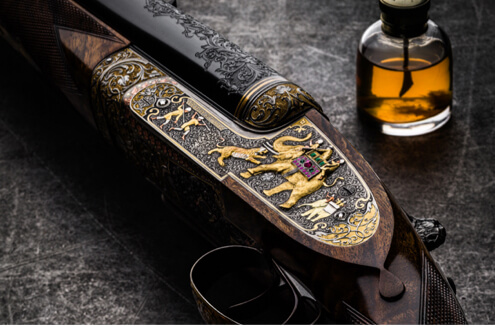
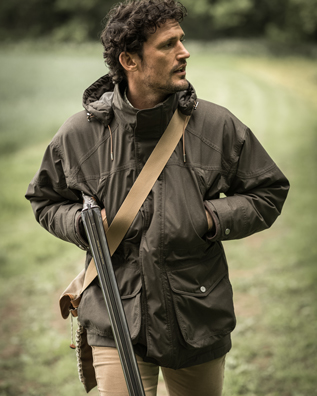
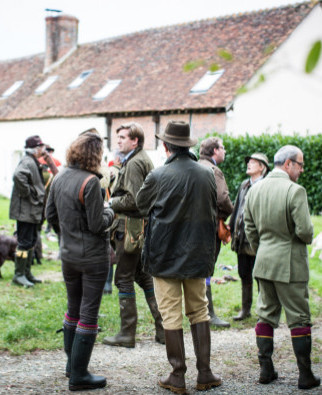





Peter Buckley. on March 4, 2017 at 5:42 am
Dear Ricky
Beautiful examples of uncommonly stocked guns, nowadays you don't see many guns with cross over stocks, especially pairs!
When you don't require anything but the norm you don't look at such guns in any great critical detail, only in wonderment in the stockers skills. In all the variations you have documented in cross over I knew only about left eye dominant right shoulder mounted.
But what a fascinating insight into other variations of cross over that I certainly never even considered, you have brought to my attention something I didn't ever realise existed!
Another thing that has just occurred to me I don't think I have ever seen such guns cased, that in itself must be wonderful to see.
Thank you Ricky for such an educational and very interesting post.
Regards. Peter.
David Hodo on March 5, 2017 at 6:56 pm
The pics of Mr. Haynes working at his craft says a lot for those such as myself. I don't believe I have ever seen a cross over stocked gun, only a very few cast on and cast off stocks. As always on this blog, interesting information form the world's best gun maker!
Thanks Ricky!
David Hodo